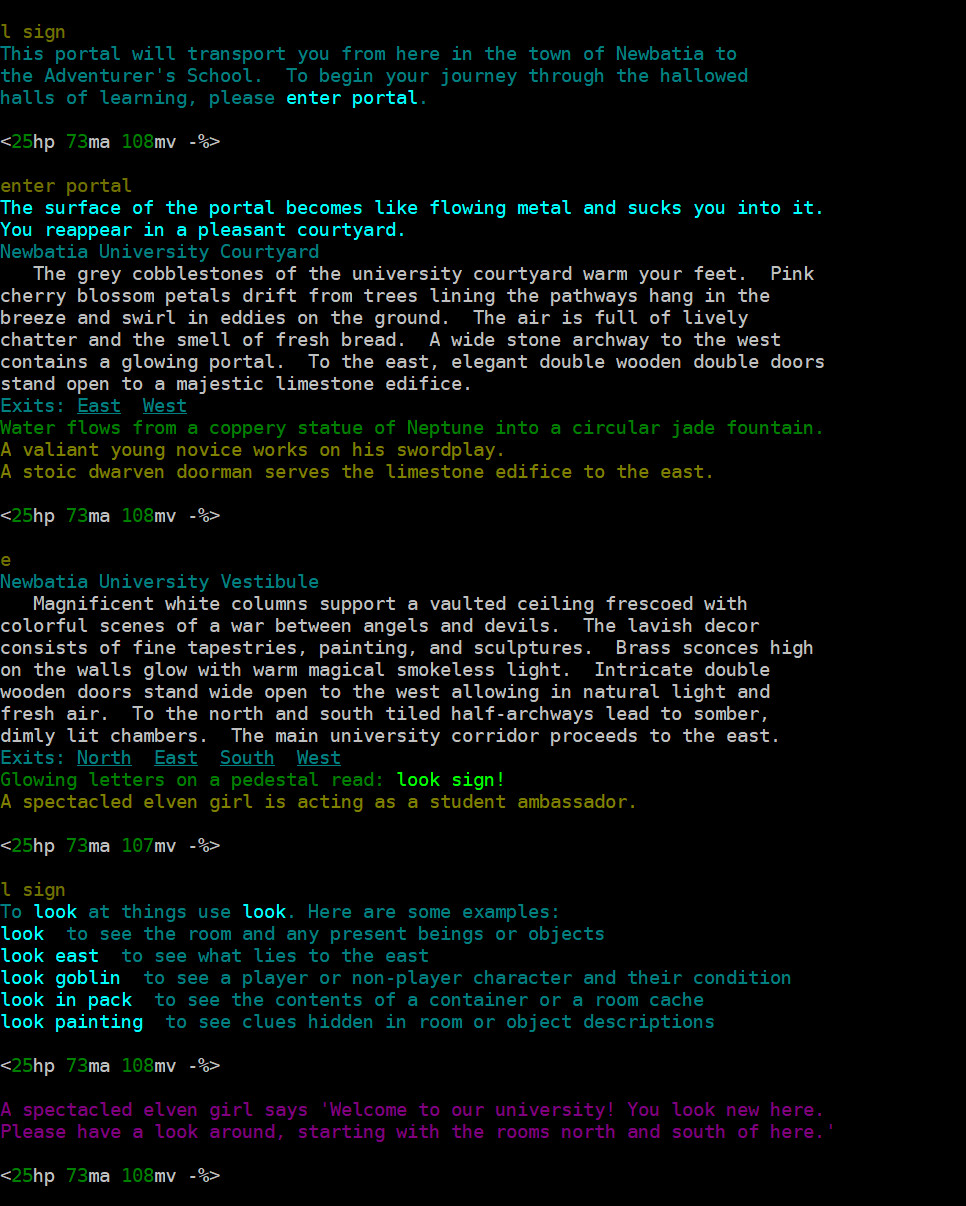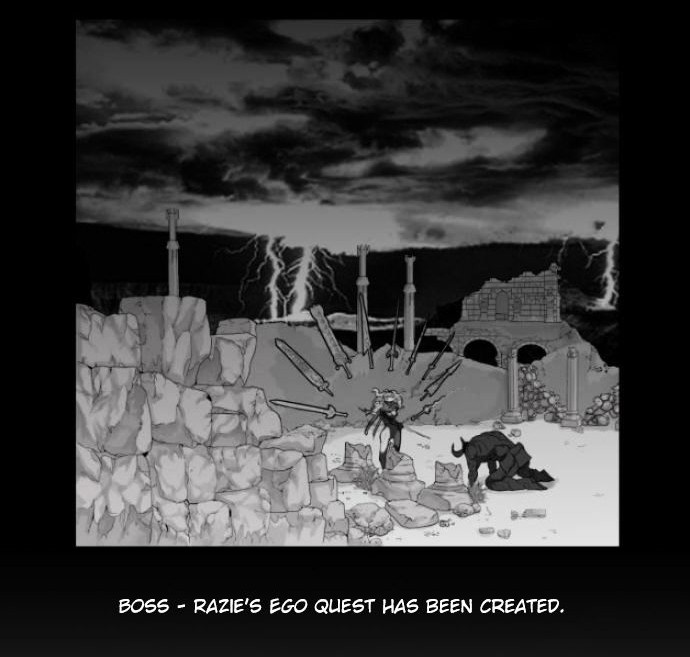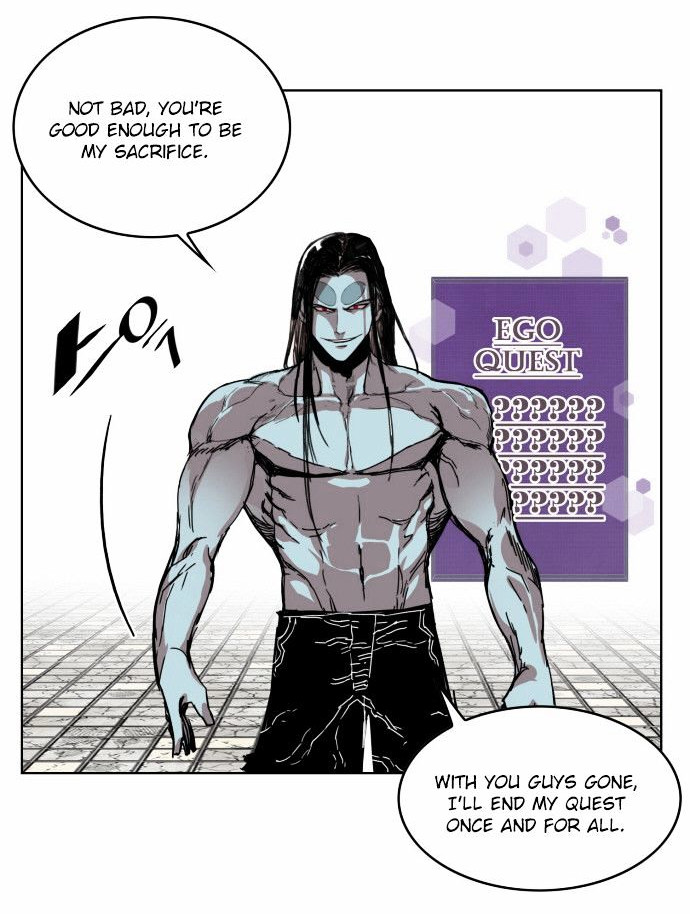Emergent Missions
Historical Overview
Quests in MUDs have come a long way since they were first introduced, especially those in the released codebases. Often quests came in the form of puzzles as opposed to the style which was popularized in MMORPGs (e.g. kill 40 wolves, bring back 15 goblin necklaces, defeat Borbok the Ogre King, etc.)Quests did evolve incrementally, with more ambiguous requests that seemed at place in single-player RPGs, such as: 'Solve the Riddle of the Hidden Keep' or 'Discover the Source of the Plague'.
One very common and rudimentary form of quest that really began to proliferate on MUDs in 1991 was the New Player type of quest. People creating a new character would start in a room where they were directed to follow the directions of the room descriptions, used to provide them with a basic understanding of MUD concepts and MUD-specific gameplay.

An example of a New Player entering a school to learn mud gameplay
- Slothmud (Diku derivative @ slothmud.org:6101)
As quest systems began to become implemented in codebases, we saw an explosion in the quantity of quests on MUDs. Where before they may have been sparse or even non-existent, now they are often ubiquitous. tbaMUD (successor of CircleMUD) has a built-in quest system that works within the OLC (OnLine Creation), so that little to no real code must be written for quests to be added or modified, and the effects are instant, no longer requiring a re-compile nor restart of the MUD server.
Emergent Missions
HCLW the Korean webcomic 열렙전사 (Hardcore Leveling Warrior: Lucid Adventure or just HCLW) has an interesting concept which I refer to as Emergent Missions, however, referred to in-verse as Ego Quests, which are quests that manifest themselves onto NPCs. There exist other types of emergent quests as well, which are not given any specific name.The premise of this unique concept hinges on an element that may be difficult to reproduce in a MUD.While not wanting to give away a very major spoiler for HCLW, it is based around a group of people who play a VRMMORPG (Virtual Reality Massive Multiplayer Role Playing Game). As the story progresses, the characters experience an aspect of the VRMMO wherein the system generates quests based on the activity of characters and NPCs. These quests can take many forms, such as providing a character a chance to correct an imbalance that has been created. This happens at one point in the story when a guild causes difficulties for a town. So the VRMMO attaches a quest to an NPC, one of the characters uncovers this hidden quest from the NPC and it then becomes their mission to both help the NPC and also discover the cause behind the problems for the NPC town.
The form of the missions can come in any format or variety, they could require a single achievement or be chain/tiered quests. They may or may not be assigned to a non-aggro NPC, or even multiple ones, or the target could even be the boss of a dungeon (although they appear to be, for the most part, only acquired by named NPCs).
Ego Quests
An example of an “Ego Quest” encountered by the characters in HLCW is when the three main characters (HLCW, Raziel, and Sora) are questing in their first dungeon together. At the top/end of the dungeon, they come across a displaced boss NPC named Razie (sometimes translated as Lazie). This NPC acquired an Ego Quest in the past because of a particularly humiliating defeat at the hands of another character (whether PC or NPC is not established) and we must assume there were multiple conditions that were met, including a very low probability of occurring.
While we’re unable to see the secret conditions of the quest being completed by the NPC (we can assume that successful completion would mean his power being fully restored and probably being sent back to his realm of origin).

Know that it is not even important whether or not this NPC-centric quest is ever even completed. That it even exists at all and has changed a MOBILE/NPC, including its location, its stats, its description, and even its nature, beyond the original intention of the MUD builder who created them and their zone, is whats truly important.
Surely, this is an example of what is meant when a game has "a life of its own" or is a "breathing, living world".
Implementation
To fully realize a system on the level described in HCLW, would require an impractical amount of engineering. I foresee the need for a sophisticated AI or advanced event engine with a random seed built in to the game server to produce such emergent behavior (on the part of the NPCs, and possibly even the environment) or quests without the presence, instigation, or even knowledge of real-life PCs (even Immortals/Wizards/Gods/Coders).The design of such an emergent behavior engine in a virtual world is worthy of its own article (even a dissertation).
Practical Implementation
The simplest solution, that would mimic such behavior from the point of view of the players, would of course be to simply have unique quests that can be assigned to a mob and pre-generated by programmers or scripters. By unique I mean that the quest can only be completed once ever. Not once per character, not once per server reset, but literally only one time ever in the lifetime of the MUD. Such quests could also be the basis for unique titles (e.g. The Hero Kvatch, The Butcher of Blaviken, etc.) or attributes/enchantments.This would also mean that game designers would have to be willing to gamble that the time and energy spent on such quests could be wasted on content that may probably never be unlocked, or only experienced by a few or even just a lone single player.
The Player Experience
What makes this concept so interesting is of course the uniqueness of the player experience. It has become common for single-player RPGs to provide multiple endings, and sometimes even multiple storyline paths in a playthrough depending on player actions and choices. Some MMORPGs have evolved this concept to a greater degree, such as SWTOR (Star Wars: The Old Republic), which not only provides radically divergent storylines depending on your character class, but also on critical choices made during your story. The story that I lived through as an Imperial Agent was worlds apart from my brother's adventure as a Bounty Hunter. Even better, depending on the choices other players made as Imperial Agents, their own stories would have diverged at certain points as well (though not to as great an extent of course). What BioWare achieved with SWTOR was far beyond what any other MMORPG has accomplished, and this remains true nearly a decade later, with no signs of being matched, much less surpassed.This would be the penultimate evolution of of quests in regards to the player experience. Players would be capable of having truly unique experiences provided by the MUD (beyond those provided by other PCs and unforeseen meta). Also it would enrich the social culture of the MUD as well. When you see a level 24 paladin walking by in town, they're much the same as any other level 24 paladins (barring equipment differences and skills developed). However, imagine seeing the Savior of the Southern Realms instead, or having in your party the infamous Faerie Bane who slaughtered the last of the faerie from the world who can no longer spawn in the MUD. Even better, imagine being there when they completed the quest, earned the title, and saw first hand a permanent change having been made to the MUD.
I cannot imagine a more thrilling and memorable experience.
Belisarius Smith

Belisarius Smith is the founder of the institute. He has a BSBA with a concentration in Security Management, received his Masters of Software Engineering from Penn State, and has a Master of Science in Psychology. He does consulting in areas such as software engineering, cloud engineering, and security.